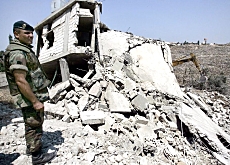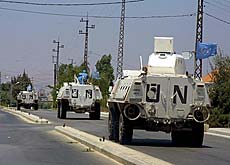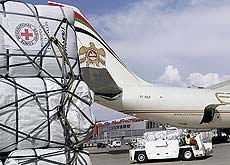Cabinet demands report on neutrality

The cabinet has asked the foreign ministry to prepare a report on how to handle Swiss neutrality during the conflict in the Middle East.
A foreign ministry spokesman has confirmed the report will also look at the application of international humanitarian law in conflicts where the parties involved are not of equal status.
The cabinet requested the report during its special meeting on the Middle Eastern conflict on Wednesday, foreign ministry spokesman Jean-Philippe Jeannerat told the Swiss news agency on Sunday, confirming reports that had appeared in the media.
The foreign ministry has not yet started work on the report, he said.
He added that the section on Swiss neutrality and the ongoing situation in the Middle East would be “wider” than the current events in Lebanon and Israel.
On the question of international humanitarian law, Jeannerat said analysis would be extended to cover other conflicts between states and groups within states.
“There are other ongoing asymmetrical conflicts,” he was reported as saying.
The news comes after a special cabinet session earlier this week where ministers controversially agreed to adopt a low profile on the conflict.
Foreign Minister Micheline Calmy-Rey, who had previously taken a strong line over the conflict, said Switzerland – the depositary state of the Geneva Conventions – would now limit itself to humanitarian affairs. She announced an additional SFr5 million ($4 million) in aid.
The apparent turnaround after Wednesday has led some experts and the media to speculate that ministers are divided on what Switzerland should be doing and saying about the conflict.
Open letter
In related news, the head of the Swiss-run International Committee of the Red Cross (ICRC), Jakob Kellenberger, said in an open letter to the NZZ am Sonntag newspaper on Sunday, that from an international humanitarian law standpoint the ongoing conflict was “an international armed conflict between Israel and Lebanon”.
This was justified by the fact that Israeli forces had operated on Lebanese territory without the consent of the Lebanese government and had used air and sea blockades, he wrote.
While it was true that the military action was taking place between Israel and Hezbollah, international humanitarian law still applied, said Kellenberger.
Civilians in both Lebanon and northern Israel were the first to suffer and the situation in southern Lebanon was “particularly dramatic” he said.
Kellenberger said the ICRC had called on the parties in the conflict to apply international humanitarian law and especially not to harm civilians.
On Sunday more than 50 civilians, including many children, were killed in Qana, a town in southern Lebanon, in the deadliest Israeli strike of the conflict. Israel has expressed its sorrow and promised to investigate.
Meanwhile, the United States secretary of state, Condoleezza Rice, has cancelled a visit to Lebanon as its prime minister says he will only discuss a full and immediate ceasefire.
swissinfo with agencies
The crisis between Israel and the Hezbollah Islamic militant group was triggered after Hezbollah captured two Israel soldiers on July 12.
More than 50 civilians, including more than 30 children, died in Israeli air attacks on the Lebanese village of Qana on Sunday morning.
Hezbollah have been firing rockets into Israel.
The Swiss foreign ministry on Sunday called for a ceasefire to protect civilians.

In compliance with the JTI standards
More: SWI swissinfo.ch certified by the Journalism Trust Initiative



You can find an overview of ongoing debates with our journalists here. Please join us!
If you want to start a conversation about a topic raised in this article or want to report factual errors, email us at english@swissinfo.ch.